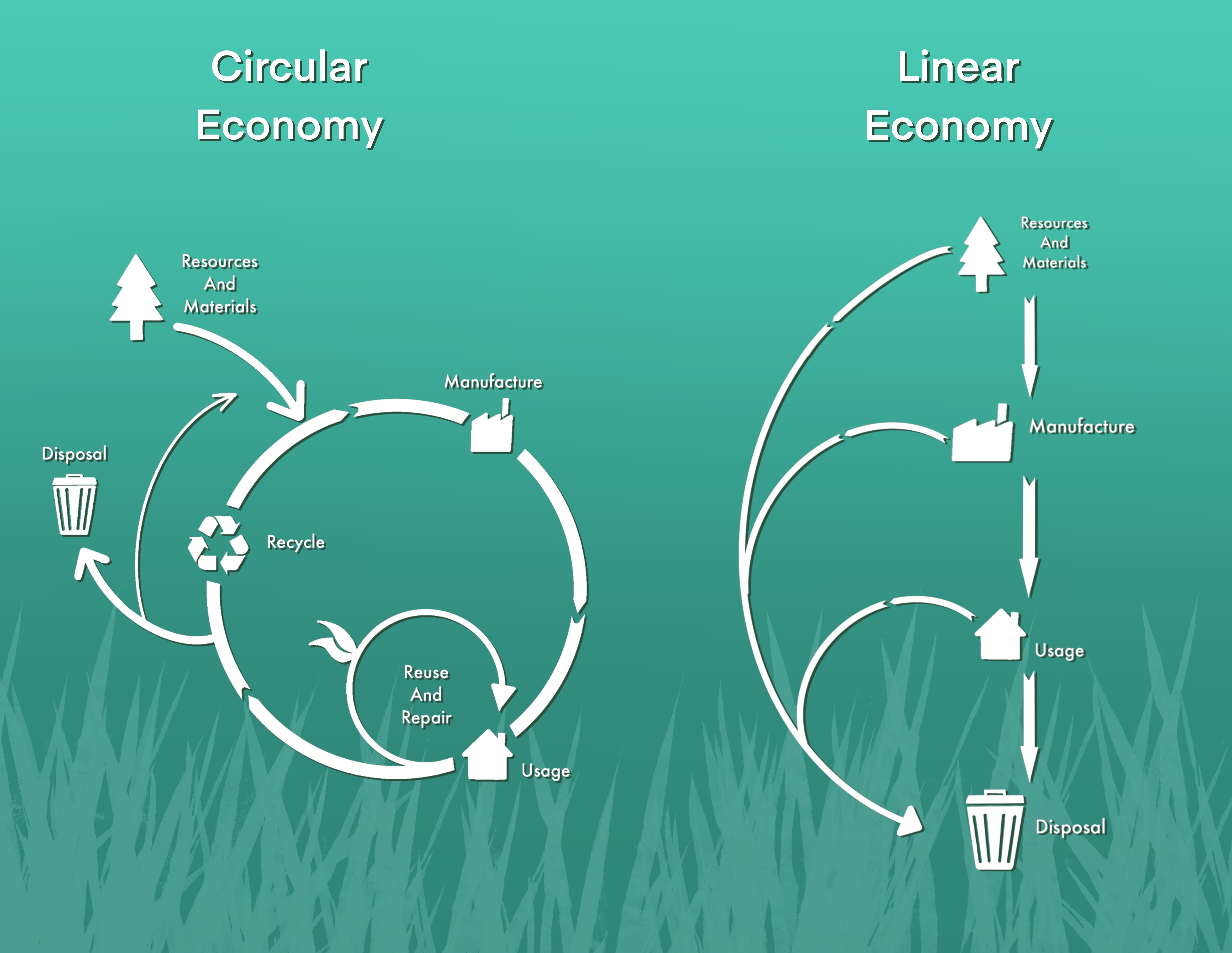Circular EconomyThe Circular Economy & How It Benefits Businesses

The circular economy is a concept that imagines a different way of running businesses and making products. It seeks to protect our planet by moving from a throwaway culture to one that reduces and reuses waste.
Our world currently functions around a “linear economy”. Product lifecycles follow a line: production – use – disposal. Needless to say, this model ends up creating a lot of waste. Many of us are well aware of the problems that huge amounts of waste are causing for our planet, from overflowing landfills to plastic pollution in the ocean.
"It goes beyond recycling, by planning the whole product lifestyle from the start"
The circular economy aims to combat this by using waste to produce new items, so that resources re-enter the economy, creating a repeating “circle”. It goes beyond recycling, by planning the whole product lifestyle from the start, to minimise any waste that will be produced and ensure that anything left over can be reused again and again. Recycling, on the other hand, is limited by the fact that certain materials can only be repurposed a finite number of times, and often only a proportion of the original material is recycled.
The circular economy is good for the planet because it helps us preserve the earth’s precious natural resources. It also helps to prevent excessive waste that pollutes and damages the environment.
It’s for this reason that many businesses are looking to transition to a circular economy model. More and more, companies are becoming aware of their impact on the world around us and want to do everything they can to make that a positive one.
Not only that: circular models can also benefit businesses by cutting production and operational costs and increasing customer trust and loyalty. In fact, many see the transition to the circular economy as inevitable for every business.
The circular philosophy
“If we are to continue living and thriving on this planet, we need to copy nature”.
The circular economy looks to nature for inspiration. In the natural world, everything is cyclical. Plants and animals that die become food for others, or nutrients for the soil. Nothing is “wasted”: it gets reabsorbed and reused by the local ecosystem. That’s why it works. According to the circular philosophy, if we are to continue living and thriving on this planet, we need to copy nature.
Our current system, on the other hand, is often described as “take, make, waste”. We’re constantly using up the earth’s natural resources, but those resources are finite. And when we’re done with them, there’s nowhere for them to go, so they just pile up, damaging ecosystems.
As well as causing great harm the environment, many believe that in the future, this way of working simply won’t be feasible. Why? Because the resources will run out. Businesses will need to transfer to a circular model in order to survive. Those who are doing so now are ahead of the curve.

The circular economy can be achieved by working with the following principles.
Moving from throwaway to reusable
A culture shift is needed to make reusable products the norm. There are so many areas where throwaway products are used even though there is a reusable alternative. Businesses in particular have the power to make a huge difference, by changing the products they choose to stock and use. Simple changes like offering washable fabric napkins instead of throwaways, or reusable metal bottles instead of plastic disposables, could save tonnes of waste from entering the natural landscape each year.
Less personal ownership
Typically, people own a product, use it for a short time, and dispose of it. However, if we rented more products than we owned, this could make up an important part of the circular economy. For example, renting out clothes, cars and appliances just for the amount of time we need them means that these items are utilised more efficiently. Fewer of them need to be produced, and less waste is created overall. If these rental products are designed to be dismantled so that the parts can be reused at the end of their life, then we are well on the way to the circular economy.
Designing circular products
As mentioned, in the circular economy, every solution or product should be designed to be reused from the very start. This could be a simple lifecycle such as a reusable coffee cup that can be used over and over. Or it might be designing a vehicle or electrical appliance so that all the parts can be used individually in a variety of applications if the product is no longer needed. As well as the actual configuration of the product, this also requires us to think carefully about the materials used. They should be long-lasting, durable, and versatile.
Examples of circular solutions
Winnow - AI to reduce food waste in hospitality
Gathering and utilising data is key for implementing circular economies. We need to know what we’re wasting, and how much of it, in order to reduce that waste. Of course, people who are running a busy restaurant don’t necessarily have the time to track and analyse food waste on a daily basis. Winnow offers a solution that uses artificial intelligence to analyse when too much food is made or ordered, and what food is leftover. From this it can make recommendations for where waste can be minimised, which can be actioned within meal planning and ordering of supplies.
UpCircle – turning food waste into skincare
The clue is in the name – British cosmetics brand UpCircle play their part in the circular economy by using by-products from the food industry to create skincare products. Materials such as leftover coffee grounds and apricot stones are saved from landfill and used to create products with lower carbon footprints. Using waste products rather than say, freshly-grown natural ingredients, also uses up fewer natural resources, such as water for soil irrigation.
BioPak – eco-friendly packaging and composting service
Packaging is a huge issue for the environment, and therefore a large focus of the circular economy. Most of us are conscious of the problems that single-use plastics cause for the environment. They aren’t biodegradable and often end up clogging up landfills or polluting our oceans and damaging marine life.
Even recyclable plastic packaging isn’t ideal. Recycling simply slows down the linear economy, rather than offering a circular solution. And when it comes to food and drink packaging, much of it can’t be recycled due to food contamination.
BioPak have devised a circular solution to combat this issue. They create compostable packaging for the hospitality industry. Rather than being a hindrance like with recycling, food residue actually aids composting. Compostable packaging on its own wouldn’t count as a circular solution, as it is still likely to be thrown away and sent to landfill. BioPak, however, close the loop by offering a collection and composting service, ensuring that the packaging ends up creating something new.
The benefits of circular economy for businesses
While the circular economy has the planet in mind, it’s actually pretty good for businesses too. After all, it’s all about efficiency and minimising waste – things that save businesses money. Here are some ways that transitioning to the circular economy could work in companies’ favour.
Lower production costs
For product-based businesses, adopting a circular model can lower your production costs. Using waste materials rather than raw materials tends to be cheaper, particularly if this is waste produced in your own business, where you also cut out disposal and procurement costs.
Show your commitment to sustainability and earn customer trust
The conscious consumer is on the rise. Customers are becoming more and more aware of environmental issues and expect the businesses they buy from to be as sustainable as possible. Adopting elements of a circular economy gives you something great to talk about in your marketing materials. Even small touches such as metal straws in a restaurant help customers to view your business more positively.
Opportunities to be innovative
According to Circulate, customers will be bypassing traditional trading channels more and more as we transition to a circular economy. There is also likely to be a rise in different kinds of businesses – with tech-based, service-based businesses growing in popularity. Just think about the success of Uber and Airbnb in the past decade. This means that there are really exciting opportunities right now for businesses to lead the way and come up with new, innovative ideas that integrate circularity.
How to move towards a circular economy in your business
You can start off by taking stock of the waste that your produce in your business and identifying ways that you could minimise waste by adopting circular solutions. It may well be that you can switch a lot of your existing suppliers to ones that use circular products or services.
Depending what industry you’re in, there may even be new and innovative solutions that you can create to combat waste issues within your sector. Learning more about the circular economy and engaging discussions could be the perfect way to spark new ideas and accelerate the circular economy revolution.

Rachel Baker
Writer
Rachel is a writer who specialises sustainability and ethical business, creating articles, blog posts and copy to inform and inspire.
